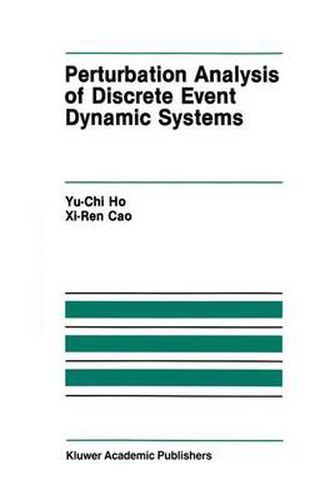Readings Newsletter
Become a Readings Member to make your shopping experience even easier.
Sign in or sign up for free!
You’re not far away from qualifying for FREE standard shipping within Australia
You’ve qualified for FREE standard shipping within Australia
The cart is loading…






This title is printed to order. This book may have been self-published. If so, we cannot guarantee the quality of the content. In the main most books will have gone through the editing process however some may not. We therefore suggest that you be aware of this before ordering this book. If in doubt check either the author or publisher’s details as we are unable to accept any returns unless they are faulty. Please contact us if you have any questions.
Dynamic Systems (DEDS) are almost endless: military C31 Ilogistic systems, the emergency ward of a metropolitan hospital, back offices of large insurance and brokerage fums, service and spare part operations of multinational fums … . the point is the pervasive nature of such systems in the daily life of human beings. Yet DEDS is a relatively new phenomenon in dynamic systems studies. From the days of Galileo to Newton to quantum mechanics and cosmology of the present, dynamic systems in nature are primarily differential equations based and time driven. A large literature and endless success stories have been built up on such Continuous Variable Dynamic Systems (CVDS). It is, however, equally clear that DEDS are fundamentally different from CVDS. They are event driven, asynchronous, mostly man-made and only became significant during the past generation. Increasingly, however, it can be argued that in the modem world our lives are being impacted by and dependent upon the efficient operations of such DEDS. Yet compared to the successful paradigm of differential equations for CVDS the mathematical modelling of DEDS is in its infancy. Nor are there as many successful and established techniques for their analysis and synthesis. The purpose of this series is to promote the study and understanding of the modelling, analysis, control, and management of DEDS. The idea of the series came from editing a special issue of the Proceedings of IEEE on DEOS during 1988.
$9.00 standard shipping within Australia
FREE standard shipping within Australia for orders over $100.00
Express & International shipping calculated at checkout
Stock availability can be subject to change without notice. We recommend calling the shop or contacting our online team to check availability of low stock items. Please see our Shopping Online page for more details.
This title is printed to order. This book may have been self-published. If so, we cannot guarantee the quality of the content. In the main most books will have gone through the editing process however some may not. We therefore suggest that you be aware of this before ordering this book. If in doubt check either the author or publisher’s details as we are unable to accept any returns unless they are faulty. Please contact us if you have any questions.
Dynamic Systems (DEDS) are almost endless: military C31 Ilogistic systems, the emergency ward of a metropolitan hospital, back offices of large insurance and brokerage fums, service and spare part operations of multinational fums … . the point is the pervasive nature of such systems in the daily life of human beings. Yet DEDS is a relatively new phenomenon in dynamic systems studies. From the days of Galileo to Newton to quantum mechanics and cosmology of the present, dynamic systems in nature are primarily differential equations based and time driven. A large literature and endless success stories have been built up on such Continuous Variable Dynamic Systems (CVDS). It is, however, equally clear that DEDS are fundamentally different from CVDS. They are event driven, asynchronous, mostly man-made and only became significant during the past generation. Increasingly, however, it can be argued that in the modem world our lives are being impacted by and dependent upon the efficient operations of such DEDS. Yet compared to the successful paradigm of differential equations for CVDS the mathematical modelling of DEDS is in its infancy. Nor are there as many successful and established techniques for their analysis and synthesis. The purpose of this series is to promote the study and understanding of the modelling, analysis, control, and management of DEDS. The idea of the series came from editing a special issue of the Proceedings of IEEE on DEOS during 1988.